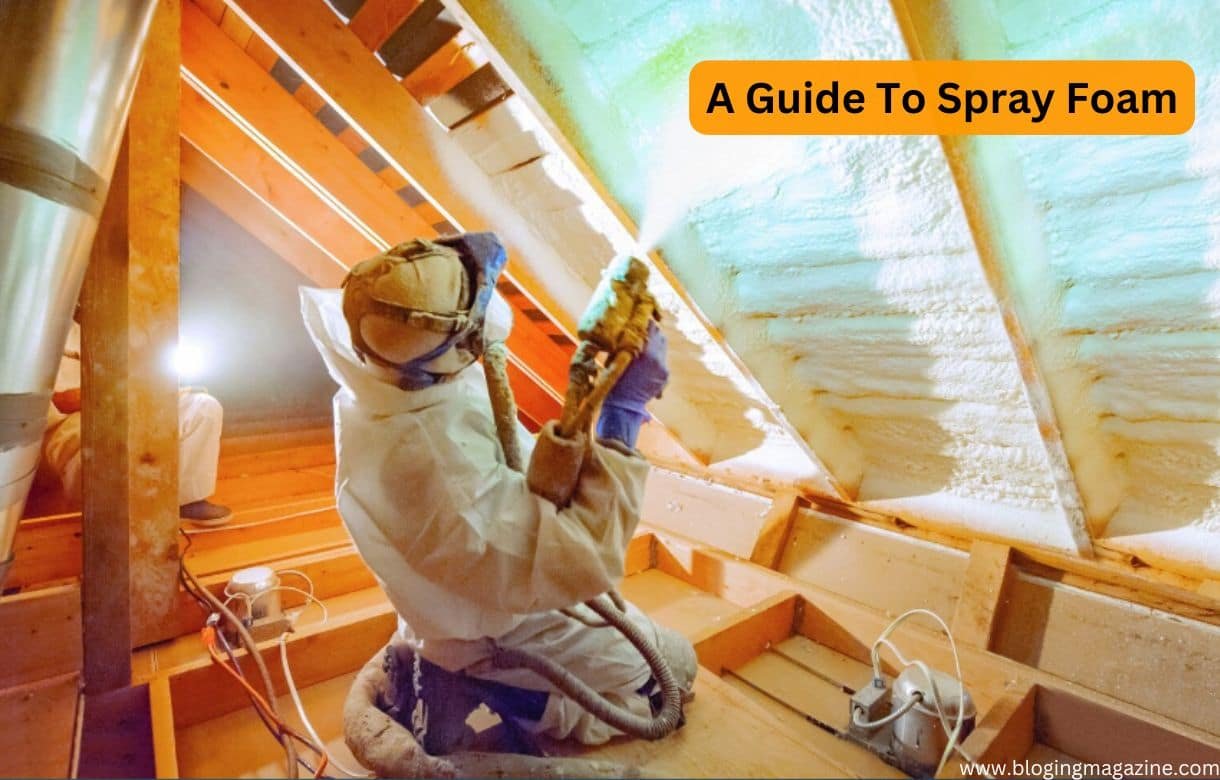Spray foam is a famous material used in the construction industry for home improvement projects. It is used for insulation, air sealing, and moisture control. In this article, I will discuss the benefits, applications, and cost-effectiveness of spray foam. I have designed this guide for homeowners and contractors to understand how spray foam works and can help you make informed decisions about using it in your projects.
Introduction of Spray Foam?
The Spray foam is a chemical product prepared by combining two main components: isocyanate and polyol resin. When we combine these two materials chemical action takes place, as a result, they react and expand, forming a solid foam. Finally, a produced chemical is applied by spraying it onto surfaces where it expands and hardens. This is very useful for filling gaps, sealing cracks, and insulating areas. It is very effective for the areas where traditional insulation materials may not be effective.
Benefits of Spray Foam
Spray foam has several key benefits for construction and insulation projects. Below, I will describe some of the most important advantages.
1. Insulation
The most widely use Spray foam is for its insulation properties. It has a high R-value, which means it provides excellent thermal resistance. This helps to keep homes and buildings warm in the winter and cool in the summer. Spray foam can minimize the need for heating and cooling systems to work harder, resulting in reduced energy bills
2. Air Sealing
One of the main advantages of spray foam is its ability to create an airtight seal. We can fill cracks and gaps in walls, ceilings, and floors by applying spray foam. This prevents air leaks, which can lead to energy loss. An airtight seal also improves indoor air quality by keeping dust, allergens, and pollutants out of the home.
3. Moisture Control
Spray foam can also help control moisture. It creates a barrier that keeps water and moisture from penetrating walls and ceilings. This way, we can resolve issues like mold and fungus, which are common in homes with poor moisture control. Proper moisture control can improve the longevity of a building’s structure.
4. Durability
After the application, when spray foam hardens, it turns into a long-lasting material. It does not drop or settle over time like other types of insulation. This resilience ensures that homeowners and building owners do not need to replace it as often as other insulation materials.
Applications of Spray Foam
Spray foam can be used in a wide range of applications, making it a versatile material for many projects:
1. Residential Insulation
Spray foam is commonly used for insulation in residential buildings. It can be applied to different places, such as walls, attics, and crawl spaces. This helps improve homes’ energy efficiency and reduce heating and cooling expenditures.
2. Commercial Buildings
Spray foam is used to insulate large spaces in commercial buildings. It is applied to roofs, walls, and floors to prevent air leaks and improve thermal performance. This is especially useful in buildings with large heating and cooling systems.
3. Air Sealing
Spray foam is also used for air sealing in residential and commercial buildings. It is used in areas where air can leak, such as around windows and doors. All these applications help to maintain a comfortable indoor environment and reduce the need for HVAC systems to run continuously.
4. Moisture Protection
In areas that are disposed to moisture, like basements and crawl spaces, spray foam is the best solution to prevent water infiltration. It can also be used to insulate pipes and prevent them from condensation. This condensation can lead to rust and damage.
5. Soundproofing
Spray foam can also be used to reduce noise. It can be applied to walls, floors, and ceilings to block sound transmission. Most importantly, it became a good choice for homes and buildings in noisy areas and rooms that require soundproofing, such as home theaters.
Cost-Effectiveness of Spray Foam
It is considered that Spray foam is costlier than other types of insulation materials, such as fiberglass or cellulose. But, in reality, it offers long-term cost savings due to its energy efficiency and durability. Here, I am going to mention some factors to consider when evaluating the cost-effectiveness of spray foam:
1. Energy Savings
Though spray foam has a higher blunt cost, its value can be noticed in significantly reduced energy bills over time. Homes and buildings insulated with spray foam tend to use less energy for heating and cooling because of their superior insulating properties. Ultimately, this leads to savings in utility bills that offset the initial cost.
2. Durability
The durability of spray foam means that it will not need to be replaced as often as other insulation materials. Traditional insulation can sag or settle over time, reducing its effectiveness. Spray foam, on the other hand, remains in place and retains its insulating properties for many years.
3. Installation Costs
Spray foam requires professional installation. This adds to the overall cost but ensures that this product is applied correctly. Improper installation can lead to issues like uneven coverage and poor insulation performance. A professional installer will have all the essential tools and expertise to ensure a proper application.
4. Long-Term Benefits
In addition to energy savings, spray foam can also prevent costly repairs. When we overcome the issue of sealing air leaks and preventing moisture infiltration, it can protect a building’s structure from damage caused by mold, mildew, and rot. This reduces the likelihood of needing expensive repairs in the future.
Is Spray Foam Right for You?
Whether you have decided to use spray foam in your project depends on your specific needs and budget. If you are looking for a material that offers superior insulation, air sealing, and moisture protection, spray foam is an excellent choice. Even though the upfront cost is higher, however, the long-term savings on energy bills and maintenance can make it a cost-effective option for homeowners and building owners.
It is important to consult with a professional installer when using spray foam in your next project. They can assess your needs and recommend the best type of spray foam for your application. They will also ensure that the product is installed properly for maximum effectiveness.
Conclusion
Spray foam is a versatile and effective material to control insulation, air sealing, and moisture. Its benefits, such as energy savings and durability, make it a popular choice for both residential and commercial applications.
While it comes with a higher upfront cost, its long-term cost-effectiveness makes it a worthwhile investment for many projects.
Whether you’re insulating a home or sealing a commercial building, spray foam can help improve energy efficiency, protect against moisture, and reduce the need for future repairs.






Sweet blog! I found it while surfing around on Yahoo
News. Do you have any tips on how to get listed in Yahoo News?
I’ve been trying for a while but I never seem to get there!
Cheers
Sorry, I have not any experience.